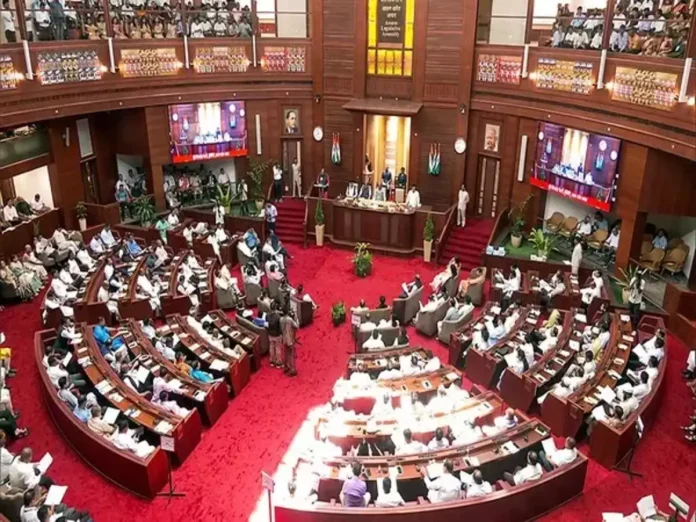The Assam Legislative Assembly witnessed a tumultuous day, leading to three separate adjournments as tensions flared between the ruling and opposition members. The disruptions stemmed from heated debates over various issues, highlighting deep-seated political divisions within the House. The opposition demanded urgent discussions on pressing concerns, while the ruling party remained steadfast in its agenda, leading to an impasse that brought legislative proceedings to a standstill multiple times throughout the day.
In This Article:
The frequent adjournments have raised concerns about legislative productivity and governance, as critical issues affecting the state remain unresolved. The Speaker’s repeated attempts to maintain decorum were met with relentless disruptions, underscoring the challenges of ensuring smooth legislative functioning.
Morning Session: Debate Over Illegal Coal Mining Incident
The session commenced with the Congress Legislature Party pressing for an adjournment motion under Rule 56, seeking a discussion on a tragic accident that occurred nearly 40 days ago in an illegal coal mine in Dima Hasao district.
Leader of Opposition Debabrata Saikia questioned the government’s reluctance to address the issue, stating:“Why does the ruling party panic at the mere mention of coal? We wanted to discuss Umrangso, but we were not allowed.”
The Speaker, Biswajit Daimary, rejected the motion, citing procedural constraints. This led to a heated exchange between opposition members and the ruling party, causing chaos in the House. As tensions escalated, the Speaker had no choice but to adjourn the Assembly for 10 minutes—the first of three adjournments.
Midday Session: Adjournment Motions and Procedural Disputes
Upon reconvening, the Assembly faced further turmoil as both the ruling coalition and opposition parties moved adjournment proposals. The ruling party sought to bring attention to the Biplab Kumar Sharma Commission’s report on the APSC (Assam Public Service Commission) scam, while the opposition continued to press for discussions on the illegal coal mining incident.
Speaker Daimary rejected all four proposals, including those from the ruling side, leading to frustration across the House. Opposition members staged a protest, accusing the government of avoiding transparency on critical matters. The Speaker’s repeated calls for order went unheeded, prompting the second adjournment of the day.
The disruptions led to a loss of significant parliamentary time, with legislators unable to engage in substantive discussions on policies and governance matters. The ruling party accused the opposition of deliberately stalling proceedings, while the opposition countered that their concerns were being silenced.
Afternoon Session: Continued Tensions and the Final Adjournment
The final session of the day attempted to resume normal proceedings, but tensions from the previous debates made it challenging to maintain order. Opposition members continued raising slogans, demanding a fair discussion on the coal mining issue, while ruling party legislators accused them of using adjournment motions as a political tool.
Despite Speaker Daimary’s efforts to restore decorum, disruptions persisted. The session eventually culminated in the third and final adjournment of the day, bringing an end to legislative discussions without any resolutions on key issues.
Speaker’s Call for Order and Legislative Decorum
Throughout the day, Speaker Biswajit Daimary repeatedly emphasized the importance of maintaining order and respecting procedural norms. He expressed frustration over the repeated disruptions, stating that frequent adjournments hinder legislative progress and prevent meaningful debates.“The Assembly is a platform for constructive discussions, not a battleground for political theatrics. If we continue like this, we are failing the people who elected us.”
The Speaker urged all members to engage in respectful discussions and prioritize governance over political posturing. However, with both sides unwilling to compromise, the stalemate persisted, raising concerns about the effectiveness of future sessions.
Historical Context: First-Ever Assembly Session in Kokrajhar
The latest adjournments follow a historic development in Assam’s legislative history. On February 17, 2025, for the first time ever, the Assam Legislative Assembly held its Budget Session in Kokrajhar instead of Guwahati. This move was seen as a step towards greater political inclusivity and decentralization.
Chief Minister Himanta Biswa Sarma hailed the session in Kokrajhar as a symbol of peace and integration, marking a significant moment for the Bodoland Territorial Region (BTR). “This decision reflects our commitment to fostering unity and giving every region of Assam an equal voice in governance.”
Despite this historic milestone, the adjournments in the subsequent sessions indicate that internal conflicts within the Assembly remain unresolved.
Implications for Legislative Functioning
The repeated adjournments in the Assam Assembly raise several critical concerns:
- Loss of Legislative Productivity: Important bills and policy discussions are delayed due to disruptions.
- Political Deadlock: The lack of consensus between the ruling and opposition parties hinders governance.
- Public Frustration: Citizens expect their representatives to address key issues rather than engage in parliamentary standoffs.
- Need for Procedural Reforms: Experts suggest the need for stricter parliamentary rules to ensure smoother legislative functioning.
With the state facing numerous challenges, including economic recovery post-pandemic, environmental concerns, and law and order issues, it is imperative for the Assembly to function efficiently and address these matters through constructive dialogue.
The events of February 19, 2025, highlight the ongoing challenges in Assam’s legislative landscape. While the Assembly remains a crucial platform for policymaking and governance, the frequent adjournments indicate the pressing need for a more collaborative approach between political factions.
Moving forward, all parties must prioritize the interests of the people over political rivalries. Ensuring smooth legislative proceedings will be essential in addressing Assam’s developmental challenges and fulfilling the promises made to its citizens.
By – Nikita
Also Read – Mary Kom Denies Resignation as IOA Athletes’ Commission Chairperson




